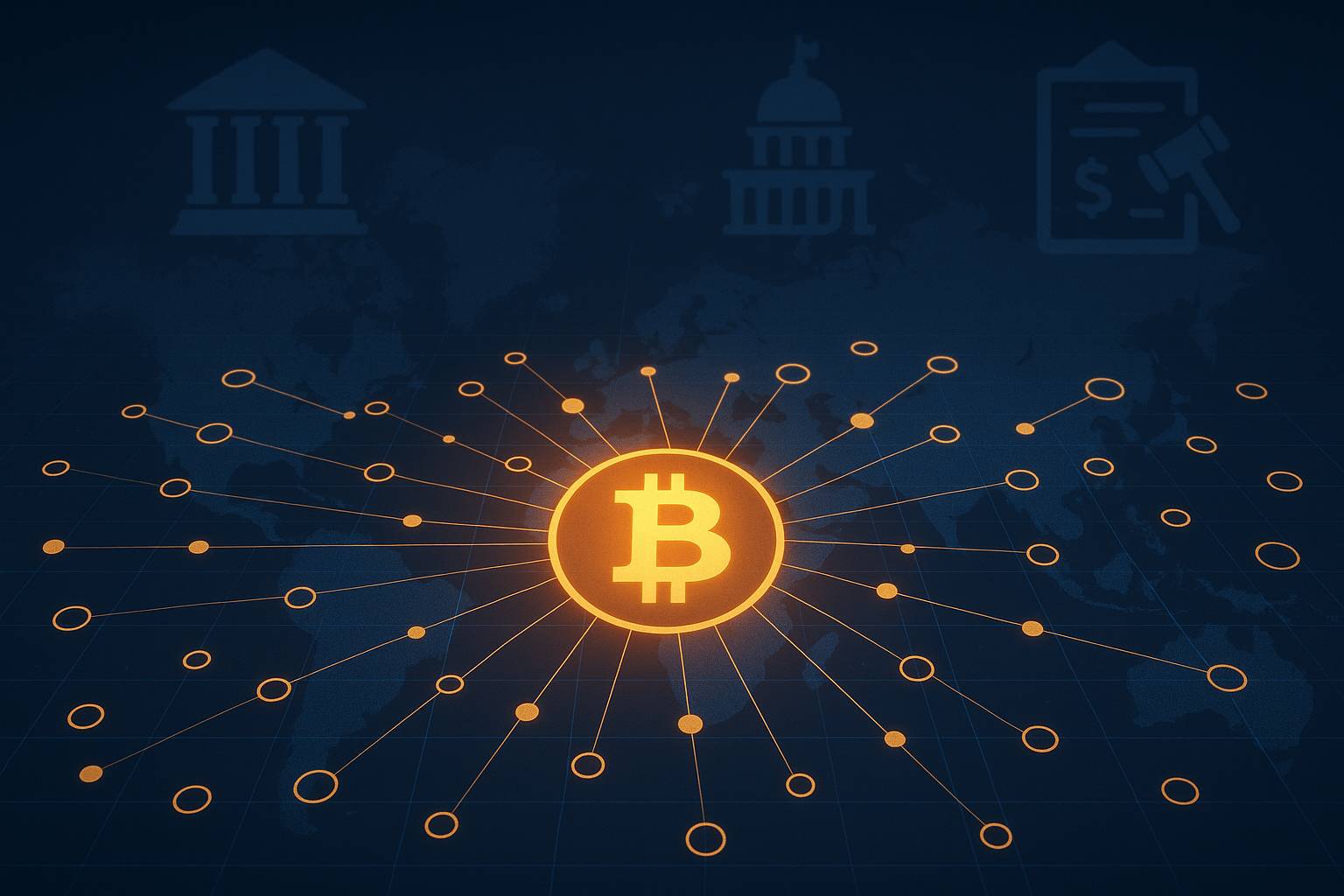Bitcoin Myth #5: Can Governments Ban Bitcoin?
It’s a common question, can governments ban Bitcoin outright. This myth persists because many people compare Bitcoin to traditional, centralized services that governments can control or shut down. But Bitcoin isn’t like anything that came before it. It’s a decentralized, borderless network designed from day one to resist censorship and survive regulation.
Can governments ban Bitcoin? Short Answer: Governments can restrict access to Bitcoin, but they cannot ban or stop the network itself. Bitcoin operates on a global decentralized system with no central authority to target or shut down.
What Makes Bitcoin Censorship-Resistant?
Bitcoin isn’t just another payment app or tech startup. It’s a decentralized monetary network secured by a global community of nodes and miners. There’s no CEO, no server farm, and no headquarters. To shut down Bitcoin, you’d have to turn off every node on Earth. A task considered impossible due to its open-source design and global distribution.

Bitcoin Runs Without a Central Authority
Governments can shut down websites, regulate companies, or restrict bank accounts, but they can’t stop a decentralized protocol that runs on tens of thousands of independent nodes worldwide. Bitcoin’s network is voluntary, borderless, and enforced by code, not by decree.

Did You Know? In 2021, China banned Bitcoin mining. The network did not skip a beat. Within months, miners relocated and the hash rate fully recovered. You can’t ban a protocol secured by thousands of independent nodes around the world.
Source: Cambridge Centre for Alternative Finance, Bitcoin Electricity Consumption Index, 2021
Insights from The Bitcoin Age by Adam Livingston
According to The Bitcoin Age (2025) by Adam Livingston, the belief that governments can control Bitcoin stems from a misunderstanding of how the network operates. Bitcoin is fundamentally resistant to intervention due to its design.
Why Governments Can’t Shut Down Bitcoin
| Core Feature | What It Means |
|---|---|
| Decentralization | Bitcoin isn’t controlled by a company, government, or single administrator. It runs on thousands of globally distributed nodes, each enforcing the same rules. There’s no central point to attack or shut down. |
| Fixed Supply | The total supply is capped at 21 million coins. No one can inflate it, print more, or manipulate its value through policy. The system operates independently of political decision-making. |
| Code-Based Enforcement | Bitcoin follows strict rules encoded in open-source software. These rules are enforced by the network itself, with no human gatekeepers. It’s all governed by consensus and math. |
| Leaderless Design | Satoshi Nakamoto stepped away from the project, ensuring that Bitcoin is not tied to any single figure. Its evolution continues through global collaboration, not centralized leadership. |
Source: The Bitcoin Age by Adam Livingston, 2025
The book emphasizes that attempts to censor or coerce the network have failed, and will continue to. Every time governments restrict Bitcoin, it adapts, reinforcing its core purpose: unstoppable, uncensorable money.
Why Governments Can’t Shut Down Bitcoin
With no central point of failure, no CEO, and no way to forge or alter the ledger, Bitcoin was purpose-built to resist coercion. Anyone can run a node. Anyone can verify the money supply. And no one can change the rules without global consensus.
Bitcoin’s Mesh Network Makes It Hard to Censor
Bitcoin’s peer-to-peer structure isn’t just decentralized, it’s flat. Nodes do not rely on centralized servers or a master directory. Instead, they communicate directly in a dynamic mesh network. This design minimizes central points of failure and makes it extremely difficult for any actor, including governments, to disrupt the flow of information.
Legal Pressure Creates Opportunity Elsewhere
Bitcoin operates in a world of legal patchworks. When one country imposes restrictions, other jurisdictions often welcome the innovation and capital flight. This process, known as jurisdictional arbitrage, creates an escape valve for Bitcoin users and entrepreneurs. It also incentivizes nations to compete for talent and resources by offering regulatory clarity.
Mining Power Follows Freedom and Cheap Energy
Bitcoin miners are naturally drawn to regions with inexpensive energy and legal stability. Mining infrastructure is modular and portable. After China’s mining crackdown in 2021, hash rate rapidly migrated to the U.S., Kazakhstan, and beyond, without interrupting Bitcoin’s function. This built-in resilience reduces long-term regulatory risk.
Bitcoin Can Hide in Plain Sight
Bitcoin transactions can be relayed over Tor, I2P, mesh networks, satellites, and even radio frequencies. Tools like Blockstream Satellite, TxTenna, and goTenna mesh devices demonstrate how Bitcoin transcends traditional internet pathways. Even under extreme censorship, users can broadcast transactions creatively and securely.
Controlling Exchanges Isn’t Controlling Bitcoin
While governments can regulate centralized exchanges, they cannot stop peer-to-peer trades or self-custody. Tools like Bisq and RoboSats allow individuals to exchange Bitcoin directly. The protocol doesn’t require permission to operate, only willingness.
Bitcoin’s Deeper Mission: Freedom from Monetary Control
Bitcoin isn’t just about digital currency, it’s about creating a voluntary, global system that functions outside state control. This idea challenges the legacy belief that money must be issued and managed by governments. With Bitcoin, the rules are set in code, enforced by users, and verified through consensus, not political power.
From Scarcity Comes Abundance
That is the promise.
That is the power.
That is Bitcoin.
Still think Bitcoin can be stopped?
Understanding Bitcoin means understanding its design. If you’re ready to go deeper, explore the full Bitcoin Myths series.
